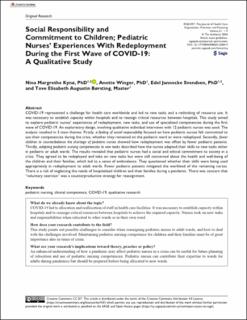| dc.contributor.author | Kynø, Nina M | |
| dc.contributor.author | Winger, Anette | |
| dc.contributor.author | Svendsen, Edel Jannecke | |
| dc.contributor.author | Børsting, Tove Elisabet A.M. | |
| dc.date.accessioned | 2024-03-20T07:45:05Z | |
| dc.date.available | 2024-03-20T07:45:05Z | |
| dc.date.created | 2024-03-19T15:04:19Z | |
| dc.date.issued | 2024 | |
| dc.identifier.citation | INQUIRY (INQ). 2024, 61 1-9. | en_US |
| dc.identifier.issn | 0046-9580 | |
| dc.identifier.uri | https://hdl.handle.net/11250/3123246 | |
| dc.description.abstract | COVID-19 represented a challenge for health care worldwide and led to new tasks and a rethinking of resource use. It was necessary to establish capacity within hospitals and to reassign critical resources between hospitals. This study aimed to explore pediatric nurses’ experiences of redeployment, new tasks, and use of specialized competencies during the first wave of COVID-19. An exploratory design, involving qualitative individual interviews with 12 pediatric nurses was used. The analysis resulted in 3 main themes. Firstly, a feeling of social responsibility focused on how pediatric nurses felt committed to use their competencies during the crisis, whether they remained on the pediatric ward or were redeployed. Secondly, fewer children to counterbalance the shortage of pediatric nurses showed how redeployment was offset by fewer pediatric patients. Thirdly, adapting pediatric nursing competencies to new tasks described how the nurses adapted their skills to new tasks either in pediatric or adult wards. The results revealed that pediatric nurses had a social and ethical commitment to society in a crisis. They agreed to be redeployed and take on new tasks but were still concerned about the health and well-being of the children and their families, which led to a sense of ambivalence. They questioned whether their skills were being used appropriately in redeployment to adult wards. Fewer pediatric patients mitigated the workload of the remaining nurses. There is a risk of neglecting the needs of hospitalized children and their families during a pandemic. There was concern that “voluntary coercion” was a counterproductive strategy for reassignment. | en_US |
| dc.language.iso | eng | en_US |
| dc.rights | Navngivelse 4.0 Internasjonal | * |
| dc.rights.uri | http://creativecommons.org/licenses/by/4.0/deed.no | * |
| dc.title | Social Responsibility and Commitment to Children; Pediatric Nurses’ Experiences With Redeployment During the First Wave of COVID-19: A Qualitative Study | en_US |
| dc.type | Peer reviewed | en_US |
| dc.type | Journal article | en_US |
| dc.description.version | publishedVersion | en_US |
| cristin.ispublished | true | |
| cristin.fulltext | original | |
| cristin.qualitycode | 1 | |
| dc.identifier.doi | 10.1177/00469580241238419 | |
| dc.identifier.cristin | 2255824 | |
| dc.source.journal | INQUIRY (INQ) | en_US |
| dc.source.volume | 61 | en_US |
| dc.source.pagenumber | 1-9 | en_US |

